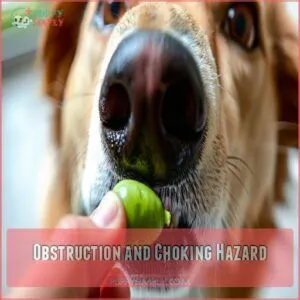This site is supported by our readers. We may earn a commission, at no cost to you, if you purchase through links.
 Yes, dogs can eat edamame beans, and they even pack a punch with protein and fiber!
Yes, dogs can eat edamame beans, and they even pack a punch with protein and fiber!
What’s the catch? It’s essential to avoid any seasoning or additives.
A handful of plain, cooked or raw edamame serves as a crunchy treat for most pups.
However, keep an eye out for allergies, especially if your dog isn’t used to soy products.
Just imagine your furry friend nibbling these green beans like you would enjoy popcorn—adorable, right?
Remember, moderation is key, and always skip the extra salt and seasonings.
Curious about more dog-friendly veggies? Stay tuned for paw-some tips ahead!
Table Of Contents
- Key Takeaways
- Nutritional Value of Edamame
- Can Dogs Eat Edamame Beans Safely
- Health Benefits of Edamame for Dogs
- Potential Risks of Edamame for Dogs
- Safe Edamame Preparation and Serving for Dogs
- How Much Edamame Can You Feed Your Dog
- Other Safe Veggies for Dogs
- Frequently Asked Questions (FAQs)
- How much edamame for a dog?
- What beans can dogs not eat?
- Is soy beans good for dogs?
- What’s the difference between edamame and soybeans?
- Can puppies eat edamame beans?
- Do edamame beans spoil easily?
- Is organic edamame better for dogs?
- Can edamame help with dog allergies?
- How to store leftover edamame for dogs?
- Conclusion
Key Takeaways
- You can safely give your dog edamame beans, but make sure they’re plain and pod-free to avoid choking and digestive issues.
- Start with small portions, about 1 tablespoon per 10 pounds of body weight, to check for soy allergies or digestive reactions.
- Edamame offers health benefits like protein and fiber, supporting healthy digestion and boosting their immune system.
- Always consult your vet before introducing new foods to ensure it’s a safe treat for your furry friend.
Nutritional Value of Edamame
You’ll find that edamame packs a powerful nutritional punch with its impressive protein content and essential nutrients like vitamins C and K, calcium, and omega-3 fatty acids.
While these young soybeans are naturally low in calories, fat, and sugar, they’re rich in fiber that can support your dog’s digestive health when served in moderation.
Protein and Fiber Content
You’ll be pleased to know that edamame packs quite a nutritional punch for your furry friend.
These young soybeans are a complete protein source, containing all essential amino acids your dog needs for healthy growth and muscle maintenance.
With their impressive fiber content, they’re great for supporting digestive health and helping maintain a healthy weight.
Just remember to keep portions moderate to avoid digestive upset.
Vitamin and Mineral Profile
Beyond its protein punch, edamame packs a powerful mix of vitamins and minerals that can benefit your furry friend.
Edamame is also a low-calorie snack, making it a great alternative to high-calorie treats, as seen in its nutritional value profile.
Here’s what makes these little green beans a nutritional powerhouse:
- Vitamin C boosts your dog’s immune system naturally
- Vitamin K helps blood clot properly when needed
- Calcium strengthens bones and teeth
- Omega-3 fatty acids promote a shiny, healthy coat
- Folate supports healthy cell growth and metabolism
Remember to serve these nutritious beans in moderation for maximum benefits.
Can Dogs Eat Edamame Beans Safely
The good news is that dogs can safely enjoy edamame as part of their diet.
These young soybeans offer a nutritious snack option when prepared correctly.
You can also find a variety of edamame dog products online at edamame dog stores.
While your pup might eye your plate of steaming edamame with interest, it’s important to understand the right way to share this treat.
Remember to remove the pods – they’re tough to digest and could cause choking.
Plain, cooked edamame beans work best for your four-legged friend.
Skip the salt, sauces, and seasonings that often accompany human servings.
Some dogs may develop soy sensitivities over time, so watch for any unusual reactions after feeding.
Start with small portions to see how your dog responds.
If you notice any digestive issues or discomfort, it’s best to discontinue and consult your vet.
Health Benefits of Edamame for Dogs
You’ll find that edamame offers your dog impressive health benefits, from reducing inflammation to supporting bone strength with its rich blend of vitamins C, K, and calcium.
Edamame can also help your furry friend enjoy better digestion and a shinier coat thanks to the protein, fiber, and omega-3 fatty acids packed into these nutritious beans.
Anti-Inflammatory Properties
Inflammation can make your furry friend’s life uncomfortable, but edamame’s omega-3 fatty acids work like natural firefighters, helping to reduce joint pain and inflammation throughout their body.
If your dog struggles with allergies or food sensitivities, these mighty beans might offer some relief.
Research suggests that regular, moderate consumption of edamame can help maintain your pup’s overall inflammatory response at healthy levels.
Digestive Health Support
Supporting your dog’s digestive health is simpler than you might think with edamame. These nutrient-packed beans deliver a powerful combination of fiber and prebiotics that can help maintain a healthy gut. Edamame can also support healthy digestion by maintaining regular bowel movements, a key indicator of overall digestive health.
Here’s how edamame supports your pup’s digestive system:
- Contains soluble fiber that aids in smooth digestion
- Acts as a natural prebiotic to feed beneficial gut bacteria
- Helps regulate bowel movements when served appropriately
- Supports healthy stool formation through proper fiber content
Skin and Coat Benefits
Your dog’s coat can get an extra shine boost from edamame’s omega-3 fatty acids.
Think of these nutrients as nature’s conditioning treatment, helping maintain healthy skin and a glossy coat.
If you’ve noticed your pup’s fur looking a bit dull lately, adding edamame to their diet might help.
The beans pack vitamin E and healthy fats that work together to nourish their skin from the inside out.
Potential Risks of Edamame for Dogs
While edamame can offer health benefits for your dog, you’ll need to watch out for potential risks like soy allergies, digestive issues, and choking hazards from the pods.
Before sharing this trendy snack with your furry friend, you’ll want to understand these important safety concerns to keep your pup healthy and happy.
Allergic Reactions
While edamame offers health benefits, some dogs can develop soy allergies over time.
Watch for these warning signs after feeding edamame:
- Excessive scratching or paw licking
- Red, irritated skin or hot spots
- Face swelling, especially around eyes and muzzle
- Frequent ear infections or head shaking
- Sudden changes in behavior or restlessness
If you notice any of these symptoms, stop feeding edamame and consult your vet for allergy testing.
Gastrointestinal Issues
Beyond allergies, edamame’s high fiber content can trigger digestive troubles in your furry friend.
Even small portions might cause gas, bloating, or diarrhea, especially if your pup isn’t used to fiber-rich foods.
Think of it like suddenly switching from your regular diet to an all-bran breakfast – your stomach would protest too!
Monitoring your dog’s reaction to edamame helps prevent these uncomfortable tummy issues.
Choking Hazards
Many dogs gulp down their treats without proper chewing, making edamame pods a serious choking risk.
The tough, fibrous texture of these pods can lodge in your pup’s throat, especially if they’re excited during treat time.
That’s why it’s essential to remove the beans from their pods before serving.
Even smaller dogs might struggle with whole pods, regardless of their chewing habits.
Obstruction and Choking Hazard
The edamame pod’s tough exterior presents a serious choking risk.
Your dog’s size directly impacts their ability to handle these fibrous shells – smaller breeds might struggle more than larger ones.
If swallowed whole, pods can cause intestinal blockages, leading to emergency vet visits.
Always remove pods before serving, and watch your pup while they eat to prevent any scary situations.
Safe Edamame Preparation and Serving for Dogs
When you’re preparing edamame for your dog, stick to plain, hulled beans and skip the salt and spices.
When introducing beans like edamame to your dog’s diet, consider the preparation methods for beans safe for dogs, such as soaking and cooking them thoroughly. It’s wise to start with small portions and check with your vet to make sure they’re a safe addition to your dog’s diet.
Preparing Edamame Safely
Before giving edamame to your dog, clean them carefully, ensuring no pod remnants remain.
Gently remove the hulls, as they’re tough to digest.
You can serve these beans raw, steamed, or lightly cooked.
Skip the spices and sauces—dogs prefer their beans bland!
Store fresh edamame properly and avoid added salt or flavorings for a healthy treat.
Portion Control
Wondering how much edamame is just right for your furry friend?
Keep it simple: 1 tablespoon of hulled beans per 10 pounds of dog weight.
It’s important to introduce edamame slowly and monitor for soy allergies.
Don’t overdo it; give this treat no more than once or twice a week.
Overfeeding might lead to tummy troubles, so stick to these guidelines to keep your pup’s tail wagging!
Consulting a Veterinarian
When evaluating Edamame as a potential treat, it’s essential to consider your pup’s overall diet, including high-quality protein sources like those found in the ideal dog food ingredients list. Considering Edamame’s impact on your pup’s health, a vet visit can clear things up.
Think of it as a pre-party check-in to make sure their tummy won’t crash after trying new treats.
Consult your vet for:
- Edamame allergies
- Dog food sensitivities can be caused by various ingredients, including certain legumes like peas, lentils, and chickpeas, which are often found in dog foods, so it’s essential to check the ingredients if your dog has a sensitive stomach issue. Dog food sensitivities
- Appropriate dietary changes
- Vet-approved snacks
This makes sure joyful snacking without unexpected health concerns.
How Much Edamame Can You Feed Your Dog
Knowing how much edamame is safe for your furry friend is key to avoiding any tummy troubles.
A good rule of thumb is one tablespoon of hulled edamame per ten pounds of your dog’s weight, no more than a couple of times a week.
Recommended Serving Size
Regarding edamame portioning for your dog, size definitely matters.
Aim to serve 1 tablespoon of hulled beans per 10 pounds of dog weight.
For your tiny companion, measure carefully—small breeds don’t need much.
Large breeds have a bit more room to munch, but always start small.
Mindful portions keep tails wagging and tummies happy!
Frequency of Feeding
Edamame, as a snack for dogs, should be given within limits.
Aim for a treat frequency that doesn’t disrupt your dog’s regular feeding schedule.
For more information on healthy dog edamame products, visit dog edamame frequency.
Offer edamame no more than once or twice a week.
This frequency supports healthy dog digestion without overwhelming their system, ensuring edamame remains a delightful and nutritious addition to their treat routine.
Other Safe Veggies for Dogs
If you’re exploring healthy vegetable options for your dog, carrots, green beans, broccoli, spinach, and sweet potatoes are great choices.
Each veggie offers unique health benefits,
making mealtime both nutritious and satisfying for your furry friend.
Carrots
After exploring edamame for your furry friend, let’s chat about carrots for dogs.
These crunchy delights are a fantastic snack.
Raw carrots offer fiber and something to gnaw on, while cooked carrots are gentle on the belly.
Packed with vitamin A, they support vision and immune health.
Carrots can keep your pup’s snacks healthy and tasty!
Green Beans
Beyond carrots, green beans are a fantastic treat for your dog.
Packed with vitamins and minerals, these crunchy snacks support bone health and hydration.
Green bean safety is key, though—serve them fresh or cooked, cutting them into manageable pieces to avoid choking.
In a way, they’re like nature’s crunchy green alternative to chips but far healthier!
Broccoli
Broccoli’s another veggie that might interest your pup after green beans.
Packed with fiber and vitamin C, it’s beneficial in small amounts.
But skip the stalks; they can pose a choking risk.
Lightly steaming it helps reduce potential gas issues.
Always think portion control—moderation’s the key!
This crunchy veggie offers a tasty alternative in your dog’s balanced diet.
Spinach
You might be surprised, but spinach is another green light for your pup! It’s packed with nutrients, but moderation is key. Too much can cause tummy troubles.
If you’re looking for healthy snack options for your furry friend, you might want to check out Edamame dog snacks, a website that offers a variety of dog-friendly treats made with edamame.
- Spinach benefits: Vitamins A & K, iron.
- Spinach risks: Oxalates (in large amounts).
- Spinach for puppies: Introduce slowly.
- Spinach serving: A small handful, a couple of times a week.
- Spinach alternatives: Kale, collard greens (in moderation).
Sweet Potatoes
Sweet potatoes, nature’s carb-packed gift, are a tasty treat for your canine buddy.
Packed with vitamins A and C and fiber, they’re great for digestion and coat health.
Just keep it simple—no spices or butter.
Want to avoid sweet potato allergies? Introduce them slowly.
Store them well, and try sweet potato recipes that suit your pet’s palate.
Frequently Asked Questions (FAQs)
How much edamame for a dog?
Give your dog plain edamame in moderation: about 1 tablespoon of hulled beans per 10 pounds of body weight, once or twice a week.
Avoid pods and seasoning to sidestep choking hazards and digestive issues.
What beans can dogs not eat?
Imagine beans as a garden.
Some, like broad beans and baked beans, hide thorns for your dog.
They’re hard to digest, lead to gas or harm red blood cells, making them unsuitable for your furry friend.
Is soy beans good for dogs?
Soybeans can be safe for dogs but should be given in moderation due to potential allergies and fiber content causing gas.
Always serve plain, unsalted, and consult your vet before introducing any new food to their diet.
What’s the difference between edamame and soybeans?
Edamame is young soybeans, harvested while still in their pods.
Think of it as the "baby" version of the soybean, ready to eat!
They’re basically the same plant, just at different stages of growth.
Can puppies eat edamame beans?
Your puppy’s nibbling on edamame is fine—just keep it plain and pod-free.
While nutrient-packed, these beans can cause tummy trouble if overdone.
Start small and watch for any allergic reactions, gradually increasing portions after consulting your vet.
Do edamame beans spoil easily?
Fresh edamame beans are highly perishable and can spoil quickly, so store them in the refrigerator and use within a few days to maintain the best flavor and nutrition.
Is organic edamame better for dogs?
Choosing organic edamame for your dog minimizes pesticide exposure, which might be better for their health.
Always make sure it’s plain and hulled, and give it in moderation.
Check with your vet before introducing new foods.
Can edamame help with dog allergies?
Edamame won’t be a magic cure for dog allergies, but the nutrients might bolster your pup’s immune system.
Edamame is soy, so watch for soy allergies.
Always consult your vet before adding new foods.
How to store leftover edamame for dogs?
Store leftover edamame for your dog in an airtight container in the fridge.
It’ll stay fresh for up to four days.
Freezing’s also an option—just make sure it’s plain and separate from your own snacks.
Conclusion
Ultimately, remember that moderation is key when giving your dog edamame beans.
You’ll want to avoid seasonings and offer only small portions.
This makes sure a healthy treat without digestive upset.
Always monitor your pup for any allergic reactions after introducing new foods.
Can dogs eat edamame beans? Yes, but safely and in small amounts!
Think of it as a special, occasional snack, not a daily meal replacement.
Enjoy those happy, healthy tail wags!

















